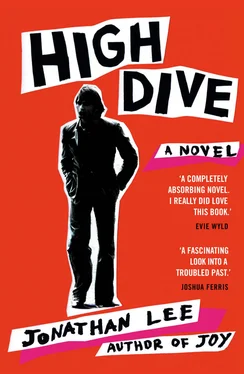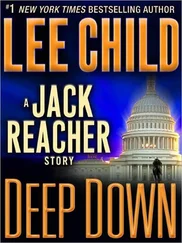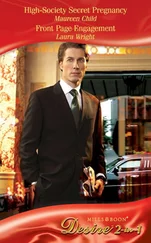He watched her eating fruit and struggled with the idea that she might have once been young.
For most of her adult life his mother had seemed to prize plausibility and security above all else. ‘Don’t get your hopes up.’ ‘Let me play devil’s advocate.’ ‘What’s not healthy is all your ideas .’ Her credo seemed to be ‘Don’t set yourself up for disappointment’. In those days, she’d frowned at any mention of religion. She saw through plot twists in television series. People who took newspaper articles at face value were fools. Kidnapped children whose innocent faces filled the news would inevitably already be dead. She believed in an illusionless life of achievable objectives in which, if a person was lucky, they’d get 1 per cent of what they wanted. She liked to claim that obtaining the Maths teaching job at Varndean — which for some reason she insisted on calling the College, the College, as if there was only one — was an achievement Moose should never have tried to better.
These days she still held him to account for giving up on teaching and tutoring, for having made the wrong life and picked the wrong woman, but in most other respects she was different to the mother he’d grown up scared of. Her sharp dark hair had turned silver and her standard small-heeled shoes had been replaced with soft flat items she referred to as pumps. It seemed to him that the arrival of these pumps on her feet a few years ago had brought with it a corresponding shrinkage in bone mass and a new interest in going to St Andrew’s on Sundays.
God. Something had changed four or five years ago in her relationship with God, namely that He had started to exist for her. The conversion had at first appeared to be purely a practical matter. A means of installing herself more seriously into the local community. Meeting new people, telling them her stories, explaining that if you marry a red-faced English postman he’ll die and leave you lonely and if you marry a Greek-restaurant manager he’ll run off and leave you lonely. (A great hobby of hers was extracting universal rules from her own particular experiences.) Also, religion offered a harmless enough chance to get free tea and cake on Tuesdays. But somewhere along the line, belief had seeped into her. More than once in the last few months she’d expressed the idea that good people went to heaven and the bad ended up in hell. What he didn’t know was how much of this was a tease, a show of false faith to rile him up. Underneath those thin cardigans a bony sense of humour lurked. He couldn’t say with any accuracy where this humour ended and her earnestness began, and at times he thought that maybe, just maybe, there was something courageously gung-ho about faith, something wonderful that he himself should sample. Walking to the outer limits of knowledge and finding only a big wide wall, most people shrugged and traipsed back to safe ground. Only a few souls stuck around, climbed, threw themselves over the top. He didn’t imagine they found much on the other side, but their hunger for perspective was humbling.
‘How’s the house?’ he said.
‘Perfect. Not that you’d know.’
‘I’ve been a little tied up with not dying.’
‘Join —’ she swallowed — ‘the club.’
‘I’d rather not.’
She began to look a little sheepish, was scratching at her ear. ‘Now. Speaking of the house … this month’s payment, Philip.’
‘Ah,’ he said.
‘There’s more to life, but it all helps, you know.’ She extended her neck. ‘It gives me no pleasure to have been ruined by a Greek.’
‘I’ll put the money into your account.’
‘I appreciate it. Does Vivienne know about your health?’
‘No.’
‘Your wife doesn’t know?’
‘Ex.’
‘What are you saying? My ears.’
‘She’s my ex -wife.’
‘And I’m your mother. Get used to it.’
He felt the special heat of her censure. There was a certain look she could produce under pressure. It could tie a man to a rove of wild donkeys, drag him across several miles of mauled stone, and leave his bloodied body tangled on torn cacti, whining like the teenager he was when she was here.
‘That Vivienne,’ she said. ‘She used to let you live in filth.’
‘Come on.’
‘Well, she did.’
‘I’ve been thinking a bit, Mum … Recently I’ve been thinking. I meant to ask —’ here he paused for effect — ‘if you think about Dad much, these days.’
She hesitated. ‘Do I think of your father? Well. I do. But only in the mornings.’ She chewed. ‘The evenings sometimes, too. You do too, I suppose.’
‘Yeah, sometimes.’
‘I told you at the wedding,’ she said, and the moment was lost.
‘I know, Mum. This is old ground.’
‘Old ground is the only ground there is,’ she said. ‘Your problem is you married an independent woman.’
‘What sort of woman should I have married?’
She seemed to give this careful consideration. ‘A dependent one.’
‘I wouldn’t say you were dependent. When it came to Dad, I mean.’
He knew his own compliment was false to the core, but nonetheless she nodded. ‘True,’ she said. ‘That’s true. But your father’s terrible habit was —’
He closed his eyes. It worked. She stopped talking. When he opened them again she was rocking gently in her chair and he feared she was having some minor fit. But then he saw what she was doing. She was trying to get closer to him without making a big thing of it. The chair moved a bit. She leaned forward and put her little rough hand on his. She left it there for a while.
‘I’ve bought one of those new word processors,’ she said.
‘Really? We’re rolling more of them out here, but there’s the potential for error. Wiped memory, and so on.’
‘Man from Curry’s came to install it. Had a chin like a bum.’
‘Ha. What about your typewriter, then? You’ll get rid of it?’
‘Embracing technology,’ she said. ‘I want to do more newsletters.’
‘For what?’ he asked, but she didn’t seem to hear.
Going between the dozen vacant rooms. Smiling at every guest he passed. Housekeeper after housekeeper kneeling in far corners, faces flushed, scrubbing. Vinegar on the mirrors. Hairdryer cords wound into neat coils. Vacuuming. Dusting. Steaming the curtains clean. All the things we call ‘cleaning’, though there’s a specific art to every task.
The bed-skirt check.
The pillow karate chop.
Knocking on the door to room 122, Thatcher’s suite, using the heavy wooden block on the key ring.
There were two maids inside the suite. A houseman dragging dirty sheets from the bed. Moose muttered his thanks, pointed out that the windows should be opened to let in some fresh air, reminded them to get extra pillows (four extra anti-allergy; four extra duck feather), and made a mental note to ask Marina to arrange more fresh-cut flowers. He went into the bathroom, scent of fake lemon. He rearranged the Q-tips, the cotton balls, the two sealed nail files and the silver-handled lint roller. Everything was close to perfection, a 9 or a 9.5.
HE WALKED ACROSS kerbstones painted red and white and blue. Overhead, flags were slapping in the wind. Curtains twitched in the windows of homes, glass soft with the last of the afternoon light, and men stared out from the drifting comfort of their cars after eight empty hours in the office. Dan wanted to know what people saw when they saw him, what assumptions or judgements they made.
The morning news had said that Thatcher, in her Brighton speech, would present Labour as the enemy within. Supporting strikers. Letting the economy grind down. Traitors with no eye for the bigger picture. Kate Adie smouldering behind the camera, a woman whose burnished sophistication turned every word on her lips into prime-time truth, the BBC version of events. And if the device didn’t work, what would it say about him? These last few nights his nerves had itched. His brain today felt overfull.
Читать дальше












